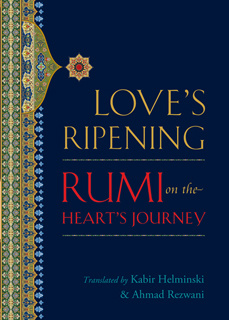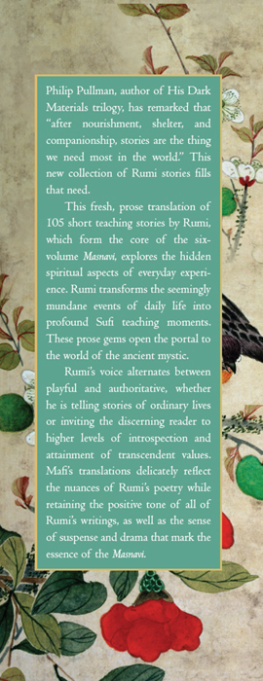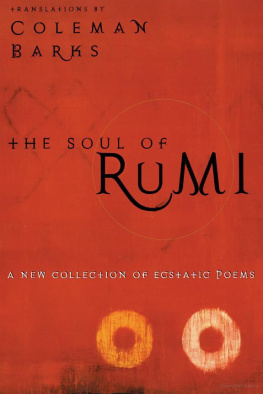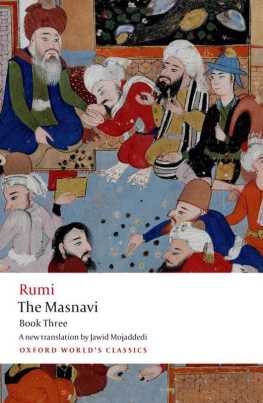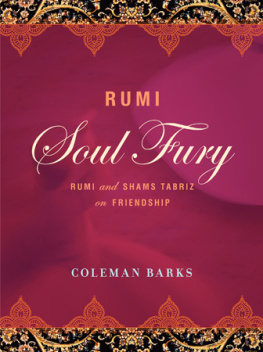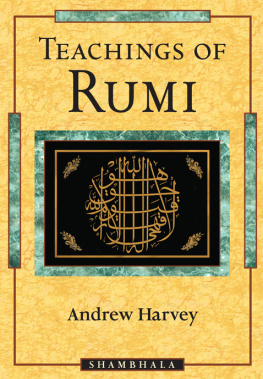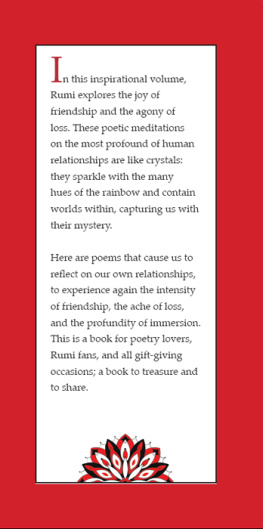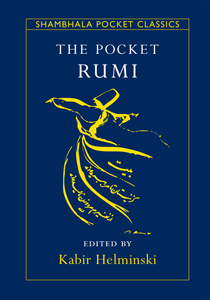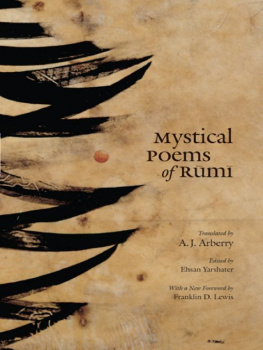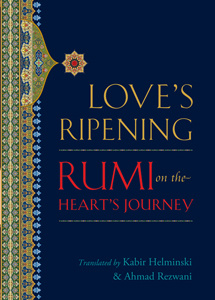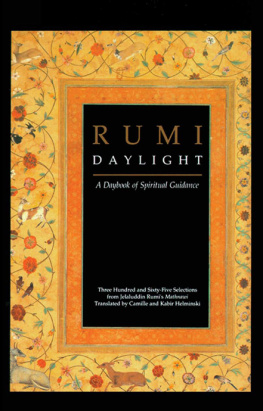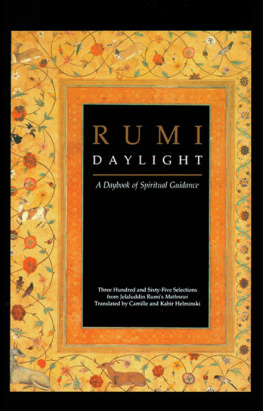Rumi - The Rumi Daybook
Here you can read online Rumi - The Rumi Daybook full text of the book (entire story) in english for free. Download pdf and epub, get meaning, cover and reviews about this ebook. publisher: Shambhala, genre: Art. Description of the work, (preface) as well as reviews are available. Best literature library LitArk.com created for fans of good reading and offers a wide selection of genres:
Romance novel
Science fiction
Adventure
Detective
Science
History
Home and family
Prose
Art
Politics
Computer
Non-fiction
Religion
Business
Children
Humor
Choose a favorite category and find really read worthwhile books. Enjoy immersion in the world of imagination, feel the emotions of the characters or learn something new for yourself, make an fascinating discovery.
- Book:The Rumi Daybook
- Author:
- Publisher:Shambhala
- Genre:
- Rating:5 / 5
- Favourites:Add to favourites
- Your mark:
- 100
- 1
- 2
- 3
- 4
- 5
The Rumi Daybook: summary, description and annotation
We offer to read an annotation, description, summary or preface (depends on what the author of the book "The Rumi Daybook" wrote himself). If you haven't found the necessary information about the book — write in the comments, we will try to find it.
Rumi: author's other books
Who wrote The Rumi Daybook? Find out the surname, the name of the author of the book and a list of all author's works by series.
The Rumi Daybook — read online for free the complete book (whole text) full work
Below is the text of the book, divided by pages. System saving the place of the last page read, allows you to conveniently read the book "The Rumi Daybook" online for free, without having to search again every time where you left off. Put a bookmark, and you can go to the page where you finished reading at any time.
Font size:
Interval:
Bookmark:
ABOUT THE BOOK My heart wandered through the world constantly seeking after my cure, but the sweet and delicious water of life had to break through the granite of my heart. When the words of Rumi enter your heart, something softens, breaks, and is subtly reborn. That he wrote the words seven hundred years ago in a medieval Persian world that bears little resemblance to ours makes their uncanny resonance to us today just that much more remarkable. Here is a treasury of daily wisdom from this most beloved of all the Sufi mastersboth his prose and his ecstatic poetrythat you can use to start every day for a year, or that you can dip into for inspiration any time you need to break through the granite of your heart. CAMILLE HELMINSKI is codirector, with her husband, Kabir Helminski, of the Threshold Society of Santa Cruz, California. She holds an honorary doctorate in Arabic from the University of Damascus and the World Union of Writers (Paris).
KABIR HELMINSKI is the author of Living Presence: A Sufi Way to Mindfulness and the Essential Self, as well as the translator of numerous books of Sufi literature and especially Rumi. He is the codirector, with his wife, Camille Helminski, of the Threshold Society, a nonprofit organization dedicated to sharing the knowledge and practice of Sufism. As the publisher of Threshold Books for some twenty years, he was largely responsible for making Rumi the most widely read poet of our time. As a producer and writer of Sufi music, he has gained recognition for numerous recordings, including his own Garden within the Flames. He is a representative of the Mevlevi tradition founded by Jalaluddin Rumi. Sign up to learn more about our books and receive special offers from Shambhala Publications.  Shambhala Publications, Inc.
Shambhala Publications, Inc.  Shambhala Publications, Inc.
Shambhala Publications, Inc.
Horticultural Hall 300 Massachusetts Avenue Boston, Massachusetts 02115 www.shambhala.com 2012 by Kabir and Camille Helminski Cover design by Gopa & Ted2, Inc. All rights reserved. No part of this book may be reproduced in any form or by any means, electronic or mechanical, including photocopying, recording, or by any information storage and retrieval system, without permission in writing from the publisher. Library of Congress Cataloging-in-Publication Data Jalal al-Din Rumi, Maulana, 12071273. [Masnavi. English.
Selections] The Rumi daybook / selected and translated by Kabir Helminski and Camille Helminski. p. cm. Poems. Translated from Persian. eISBN 978-0-8348-2773-8 ISBN 978-1-59030-894-3 (pbk.: alk. paper) I. paper) I.
Helminski, Kabir Edmund, 1947 II. Helminski, Camille Adams, 1951 III. Title. PK6481.M8E52 2012 891.5511dc22 2011014499 CONTENTS In the Name of our Infinitely Compassionate and InfinitelyMerciful Source Speech is of three kinds: the first comes from the desire of the self, the second from reason, and the third from love. Speech which arises from desire is troubling and insipid, giving neither pleasure to those who speak nor profit to those who listen. That which arises from reason is accepted by the wise and gives pleasure to the listener and the speaker, and speech that arises from love renders enraptured those who listen and those who speak.
FOR OVER THIRTY-FIVE YEARS NOW we have been following the Way of Rumi, so grateful for his companionship, his heart, his being and example, grateful to be allowed the moments to immerse in his loving words and his presence and that of his mentor and dearest friend, Shams of Tabriz. And we are grateful to be able to share with you now this small offering of passages from Rumis overflowing fountain of deep heart wisdom. Weve chosen to open this volume with the selection You Are Joy, offering that as the context for the unfolding of this daybook, because the recognition of the joy that opens from the speech of Love feels so needed in our world at this time. Many challenges face us in current times, but Rumi also lived in the midst of very challenging times. Still he was able continually to open to and rely on that deeper joy of Love, moving through every moment and every manifestation. His words assist us in discovering that love within ourselves and among us all, sustaining all that is.
In a passage from the Menaqib al-Arifin, the Stories of the Wise Ones, of the spiritual path that unfolded following the example of Rumi, his son Sultan Weled relates the following story: Sultan Weled told us this: One day I felt bored and downhearted. My father came into the college and saw that I was sad and said: Are you angry at someone? You seem so downcast. I dont really know what the matter is, I replied. He disappeared into another room and, after a few minutes, returned with his face and head covered with an old wolfskin. Bou! Bou! he cried, just as if I were a child again. I burst out laughing and laughed until I could laugh no more and then kissed my fathers blessed feet.
Oh, Bahaeddin, he said. Are you afraid when someone who loves you dresses up in a wolfskin? No, I said. That same person who can cause you such joy can also cause you sorrow. Why feel sad for no good reason and why allow yourself to be a prisoner of negativity? Find a way out of your despondency, and know that all difficulties have a common cause. Treat your joy like a delicate plant and water it; when it has borne fruit share that with your friends. As my father spoke, Sultan Weled continued, I experienced a profound feeling of ecstasy and my heart expanded like a flower.
For the rest of my life, I never again felt sad and learned to detach from the troubles of the world. It is always a joy to share the encouraging words of Rumi with others and feel hearts awakening to that friendshipand through him, friendship with the Beloved, the Source of all our sustenance and growth and well-being, no matter what experience we may be passing through at any moment. Continually Rumis words convey to us the fragrance of that placeless place of Love, calling us into the Presence of the Beloved. May we keep opening more and more to that Presence and that Love: It is Love that makes people happy. It is Love that fills happiness with joy. It is Love that birthed me, not my mother.
A hundred blessings and praises to that Mother! Your fragrance is always with me. Your Face never leaves my sight. Day and night Ive been longing for You. My life is spent, but my desire for You remains. O heart, throw your clothes down upon the way, and cover your face with the shirt of Joseph. Youre just a small fish; you cant live without water.
Dont think about it, just throw yourself into this stream. Camille Helminski . Menaqib al-Arifin, passage 414, excerpted from Rumi and His Friends, Stories of the Wise, selections from Aflaki, translated by Camille Helminski and Susan Blaylock. . Ibid., passage 209. .
Mevlana Jalaluddin Rumi: Quatrain 449, Quatrain 450, and Quatrain 936. Translated by Camille and Kabir Helminski. The numbering of the quatrains is according to the numbering used by Mr. Badi al-Zaman Faruzanfar in his edition of the Divan-e Shams-e Tabrizi. BEFORE BEGINNING to read this collection of Rumis writings one would do well to have some sense of the spiritual universe he came fromthe culture of mystical Islam that flourished in the Persian-speaking lands from Anatolia to Khorasan, that is, the lands from central Turkey east as far as northwestern Iran, Afghanistan, and Central Asia. Mystical Islam was at that time a respected, almost mainstream phenomenon, characterized by an abiding sense of the sacred, an appreciation of the dignity of the human being, and a high degree of spiritual refinement.
Next pageFont size:
Interval:
Bookmark:
Similar books «The Rumi Daybook»
Look at similar books to The Rumi Daybook. We have selected literature similar in name and meaning in the hope of providing readers with more options to find new, interesting, not yet read works.
Discussion, reviews of the book The Rumi Daybook and just readers' own opinions. Leave your comments, write what you think about the work, its meaning or the main characters. Specify what exactly you liked and what you didn't like, and why you think so.

